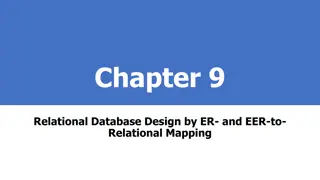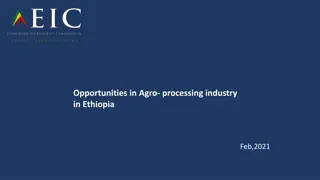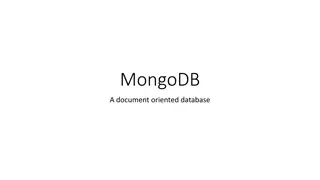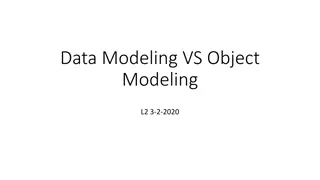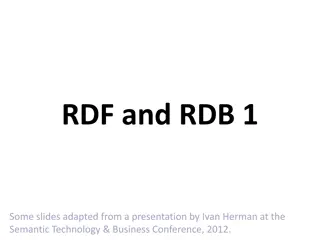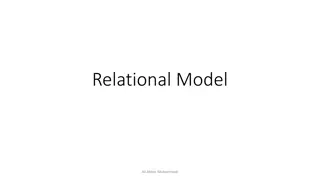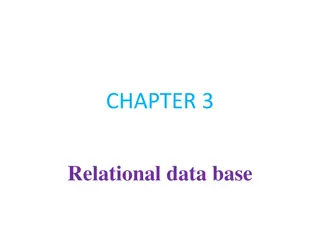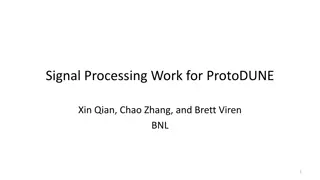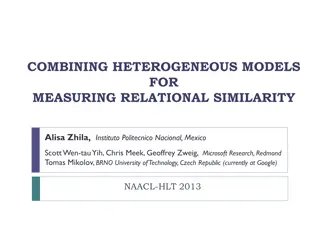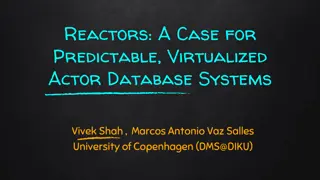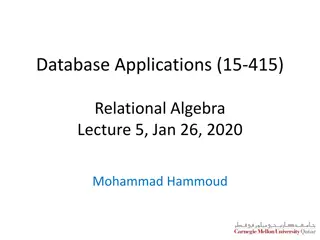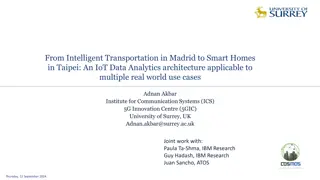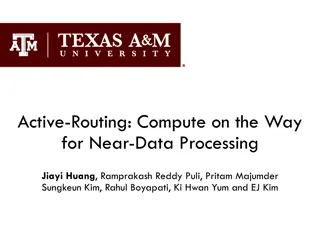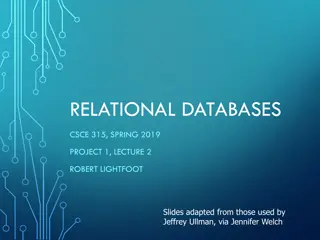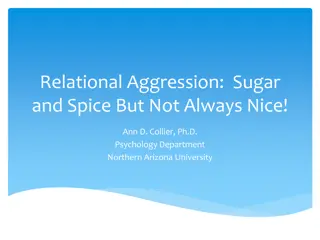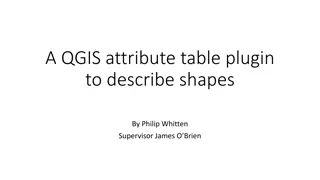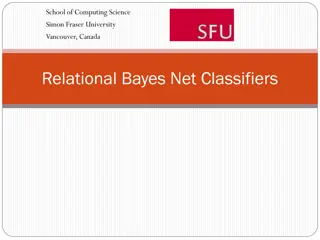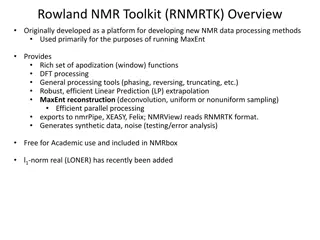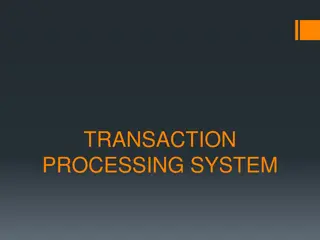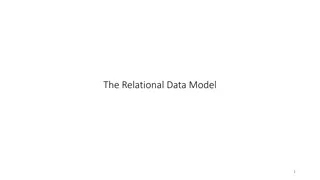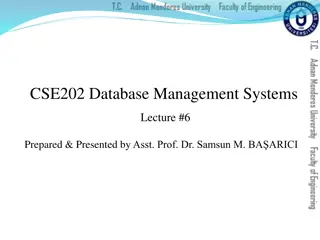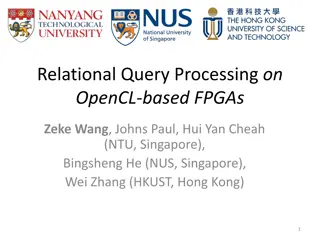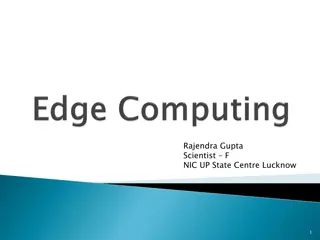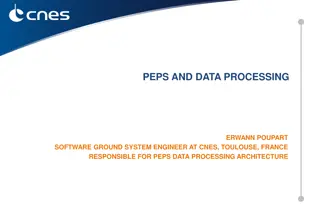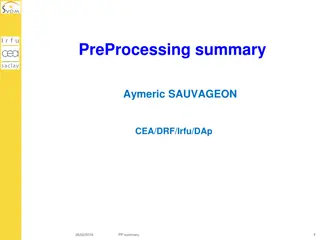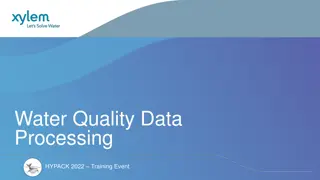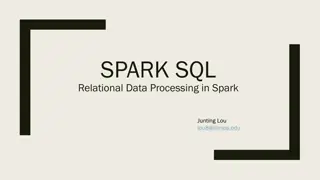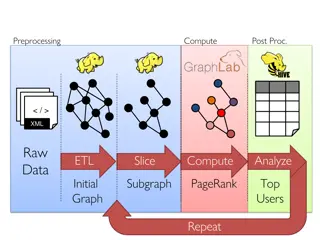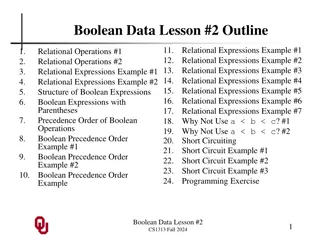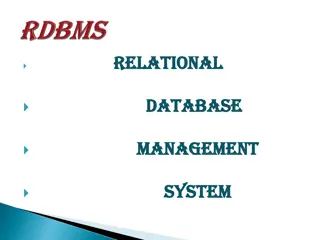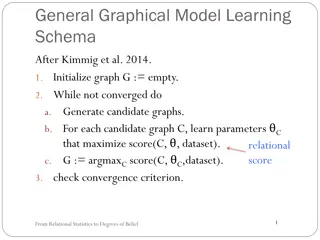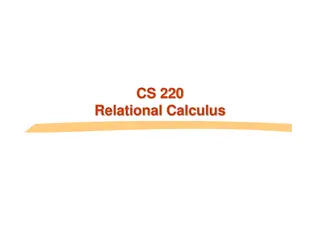Progressive Approach to Relational Entity Resolution
In this research paper authored by Yasser Altowim, Dmitri Kalashnikov, and Sharad Mehrotra, a progressive approach to relational entity resolution is presented. The study focuses on balancing cost and quality in entity resolution tasks for relational datasets. The goal is to develop a method that ac
1 views • 20 slides
Understanding Relational Database Design and Mapping Techniques
Explore the process of mapping Entity-Relationship (ER) and Enhanced Entity-Relationship (EER) models to relational databases. Learn about relational model concepts, mapping algorithms, and the goals and steps involved in the mapping process. Discover how to preserve information, maintain constraint
3 views • 42 slides
Real-Time Data Insights with Azure Databricks
Processing high-volume data in real-time can be achieved efficiently using Azure Databricks, a powerful Apache Spark-based analytics platform integrated with Microsoft Azure. By transitioning from batch processing to structured streaming, you can gain valuable real-time insights from your data, enab
0 views • 23 slides
Opportunities in Ethiopia's Agro-Processing Industry
Ethiopia stands out as a leader in raw material production for agro-processing industries, offering opportunities in dairy, juice processing, edible oil processing, poultry, beef production, and tomato processing. With abundant resources, suitable climate conditions, and a growing domestic market, E
0 views • 8 slides
MongoDB vs. Relational Databases: Myth vs. Reality in NoSQL Design
MongoDB is a document-oriented database that challenges traditional relational databases by offering flexible schema designs. While myths suggest no need for schema design or relationships in MongoDB, the reality emphasizes the importance of thoughtful schema design and choice in data relationships.
2 views • 21 slides
Understanding Data Modeling vs Object Modeling
Data modeling involves exploring data-oriented structures, identifying entity types, and assigning attributes similar to class modeling in object-oriented development. Object models should not be solely based on existing data schemas due to impedance mismatches between object and relational paradigm
0 views • 17 slides
Understanding Enduring Relational Themes in Psychotherapy
Exploring the concept of Enduring Relational Themes (ERTs) in psychotherapy, this content delves into the history of transference in Gestalt therapy, contemporary psychoanalysis perspectives, forms of transference, and Lynne Jacobs' insights. It highlights how ERTs manifest, their impact on therapy,
5 views • 9 slides
Exporting Relational Data to RDF: Strategies and Considerations
Explore the process of mapping relational data to RDF, including the choice of RDF vocabulary, defining mapping techniques, and exporting strategies. Learn about RDB systems that support RDF, direct mapping approaches, and the use of hybrid storage solutions. Discover how to bridge SPARQL and SQL fo
1 views • 13 slides
Understanding the Key Concepts of Relational Databases
Introduction to the fundamental concepts of relational databases including the relational model proposed by Edgar F. Codd, relation schemes, relation instances, keys for a relation, and more. Discover the significance of keys, candidate keys, superkeys, and primary keys in database design.
0 views • 27 slides
Understanding Relational Databases and File-Based Systems
This chapter delves into the fundamental concepts of databases, comparing them to file-based systems, and highlighting the significance of relational databases in modern integrated AISs. It explores the difference between logical and physical views of databases, introduces key concepts such as DBMS
0 views • 70 slides
Advancements in Signal Processing for ProtoDUNE Experiment
The team, including Xin Qian, Chao Zhang, and Brett Viren from BNL, leverages past experience in MicroBooNE to outline a comprehensive work plan for signal processing in ProtoDUNE. Their focus includes managing excess noise, addressing non-functional channels, and evolving signal processing techniqu
1 views • 23 slides
Enhancing Relational Similarity Measurements: A Model Combination Approach
This study explores combining heterogeneous models for measuring relational similarity, showcasing the importance of general relational similarity models. It discusses the degrees of relational similarity and introduces a directional similarity model that outperforms previous systems. The approach l
0 views • 23 slides
Reactor: A Case for Predictable, Virtualized Actor Database Systems
Exploring the integration of actor programming models in modern relational databases to achieve high performance. The focus is on addressing challenges related to stored procedures, data partitioning, modularity, isolation, software engineering, and performance. The talk outlines motivation, the rel
0 views • 41 slides
Understanding Relational Query Languages in Database Applications
In this lecture, Mohammad Hammoud discusses the importance of relational query languages (QLs) in manipulating and retrieving data in databases. He covers the strong formal foundation of QLs, their distinction from programming languages, and their effectiveness for accessing large datasets. The sess
0 views • 39 slides
Challenges and Innovations in Relational Engine Algorithms
Exploring the complexity of processing graph data in relational query engines, this content delves into the challenges faced, practices adopted in academia, and innovative solutions like LMS-NPRR, trie join, and specialized data structures. It discusses the difficulties in handling acyclic vs. cycli
0 views • 27 slides
IoT Data Analytics Architecture for Real-World Use Cases
Explore the IoT data analytics architecture proposed by Adnan Akbar from the University of Surrey, applicable to diverse real-world scenarios like smart homes in Taipei. Discover how IoT leverages the connection of everyday objects to the internet, enabling remote control of physical environments. D
0 views • 22 slides
Understanding Relational Evangelism and Sharing Your Faith Testimony
Discover the essence of relational evangelism and effectively articulating your testimony of faith. Explore the significance of the Gospel message and different evangelistic approaches while delving into the concept of personal evangelism without imposition. Embrace the idea of faith arising in vari
0 views • 32 slides
Enhancing Near-Data Processing with Active Routing
Explore the implementation and benefits of Active-Routing for efficient data processing in memory networks. Motivated by the increasing demands for memory in graph processing and deep learning, this approach aims to reduce data movement, energy consumption, and costs associated with processing large
0 views • 46 slides
Fundamentals of Relational Databases in CSCE 315 - Lecture Highlights
Introduction to relational databases covering topics such as relational data model, schemas, converting from entity-relationship model, entity sets, relations, relationships, combining relations, and practical examples. Learn about storing data in tables, attributes, database organization, and the i
1 views • 18 slides
Understanding Relational Aggression in Girls: The Impact on Social Relationships
Relational aggression, a form of social bullying, can have detrimental effects on girls' social relationships and self-esteem. This type of indirect aggression includes behaviors like exclusion, spreading rumors, and social manipulation. Understanding and assessing relational aggression is crucial f
0 views • 22 slides
Enhancing Spatial Data Analysis in QGIS
Explore the integration of relational databases with QGIS to facilitate efficient spatial data analysis. Discover the importance of recognizing spatial relationships within data sets and the solutions to enhance QGIS for relational datasets. Overcome challenges and delve into the intersection and su
0 views • 25 slides
Understanding Relational Bayesian Networks in Statistical Inference
Relational Bayesian networks play a crucial role in predicting ground facts and frequencies in complex relational data. Through first-order and ground probabilities, these networks provide insights into individual cases and categories. Learning Bayesian networks for such data involves exploring diff
0 views • 46 slides
Overview of RNMRTK Software for NMR Data Processing
Rowland NMR Toolkit (RNMRTK) is a comprehensive software platform primarily used for NMR data processing tasks such as running MaxEnt, apodization, DFT processing, linear prediction, and more. It offers a robust set of tools for various processing needs and supports efficient parallel processing. RN
0 views • 17 slides
Understanding Transaction Processing Systems (TPS)
Transaction Processing Systems (TPS) are vital components in capturing, storing, and processing data generated from various business transactions. They ensure efficient handling of high volumes of data while maintaining accuracy, security, and privacy. TPS operate through automated data entry, batch
0 views • 24 slides
Understanding the Relational Data Model and Database Concepts
Delve into the world of relational data modeling, database integrity rules, and structure. Explore how a university database in MS Access utilizes relational tables and fields to store information. Learn about the key terminology associated with relational databases, such as primary keys, foreign ke
0 views • 69 slides
Women's Self-Esteem and Relationship Behavior Study: Insights and Implications
This study explores the relationship between women's self-esteem, relational behavior, and perceptions of relational desirability. Findings indicate that self-esteem does not significantly predict relational behavior, with women feeling less desirable than their partners reported investing more in r
0 views • 9 slides
Object-Oriented Database Concepts and Limitations in Relational Models
Object-oriented database concepts are introduced as an alternative to relational models, addressing limitations such as lack of support for complex data structures, generalization, specialization, and aggregation. The shift towards a more data-centric approach in information systems development is d
1 views • 82 slides
Understanding Relational Child and Adolescent Psychotherapy
Explore the concepts of relational child and adolescent psychotherapy involving attachment patterns, intersubjectivity, corrective emotional experiences, and the role of the relational psychodynamic psychotherapist in providing corrective emotional experiences essential for the child's development.
0 views • 25 slides
Relational Query Processing on OpenCL-based FPGAs
This study explores the efficient processing of relational queries on FPGA hardware using OpenCL, a programming language for heterogeneous computing environments. The evolution of FPGA architectures, optimization methods for OpenCL, and the benefits of kernel vectorization and compute units are disc
0 views • 38 slides
Understanding Edge Computing for Optimizing Internet Devices
Edge computing brings computing closer to the data source, minimizing communication distances between client and server for reduced latency and bandwidth usage. Distributed in device nodes, edge computing optimizes processing in smart devices instead of centralized cloud environments, enhancing data
0 views • 32 slides
Insight into PEPS Data Processing Architecture by Erwann Poupard
Erwann Poupard, a Software Ground System Engineer at CNES, Toulouse, France, plays a crucial role in the PEPS data processing architecture. The outline covers PEPS HPSS data storage statistics, current data processing trends, and future plans including PEPS V2 development. Explore PEPS processing ch
0 views • 8 slides
Understanding Data Modeling for Optimal Performance
Data modeling is crucial for efficient relational and non-relational databases. It involves making decisions on normalization, denormalization, embedding, and referencing to optimize performance and minimize costs. By strategically structuring data, you can achieve the benefits of joins without the
0 views • 36 slides
Data Processing and Preprocessing Summary
In this document, Aymeric Sauvageon from CEA/DRF/Irfu/DAp presents a detailed overview of the preprocessing steps involved in data processing from L0 to L1. It covers the definition of L0/L1 and coding, utilization of the database for processing, input file specifications from China, packet content
0 views • 11 slides
HYPACK 2022 Training Event: Water Quality Data Processing Overview
In the HYPACK 2022 Training Event, participants will learn about processing water quality sensor data, ADCP in-situ data, and geodetic parameters. The session covers tools included in HYPACK, changes to streamline workflows, and the Environmental Editor program for loading and processing data. Atten
0 views • 12 slides
Overview of Spark SQL: A Revolutionary Approach to Relational Data Processing
Spark SQL revolutionized relational data processing by tightly integrating relational and procedural paradigms through its declarative DataFrame API. It introduced the Catalyst optimizer, making it easier to add data sources and optimization rules. Previous attempts with MapReduce, Pig, Hive, and Dr
0 views • 29 slides
Data Processing and Analysis for Graph-Based Algorithms
This content delves into the preprocessing, computing, post-processing, and analysis of raw XML data for graph-based algorithms. It covers topics such as data ETL, graph analytics, PageRank computation, and identifying top users. Various tools and frameworks like GraphX, Spark, Giraph, and GraphLab
0 views • 8 slides
Understanding Relational Operations for Boolean Expressions
Learn about relational operations in Boolean expressions through examples and explanations. Discover how to compare numeric operands to produce Boolean results, covering equal to, not equal to, less than, less than or equal to, greater than, and greater than or equal to operations. The content inclu
0 views • 25 slides
Evolution of Database Management Systems
The evolution of Database Management Systems (DBMS) began with file systems and punched cards in the 1950s, followed by hierarchical and network models in the 1960s and 1970s. The 1980s introduced relational databases like Ingres, Oracle, DB2, and Sybase. The 1990s saw the rise of object-oriented an
0 views • 31 slides
Learning Bayesian Network Models from Complex Relational Data
Delve into the process of learning Bayesian network models from complex relational data, extending traditional algorithms to suit relational data structures. Explore key concepts like likelihood functions, graphical model initialization, and parameter learning for effective model fitting.
0 views • 20 slides
Introduction to Relational Calculus and Algebra in Database Management
Explore the fundamental concepts of relational calculus and algebra in the domain of database management. Understand the differences between declarative and imperative query languages and learn to retrieve information using practical examples and theoretical frameworks such as tuple relational calcu
0 views • 23 slides

